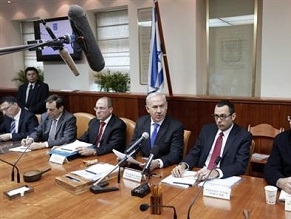|
World Jewish News

The Israeli cabinet on Sunday approved the release of 104 Palestinian prisoners convicted of deadly terrorist attacks.
|
Israel and the Palestinians to resume talks Monday in Washington
29.07.2013, Israel and the World Israel and the Palestinians will resume direct peace talks on Monday in Washington, the US State Department announced Sunday.
The announcement came shortly after the Israeli government agreed to release 104 long-term Palestinian prisoners, some of whom are serving life sentences for deadly terrorist attacks against Israelis, meeting a longstanding Palestinian demand.
The prisoners are to be released in several phases, contingent on the progress of negotiations.
State Department spokeswoman Jen Psaki said Israel and the Palestinians had accepted invitations from US Secretary of State John Kerry to come to Washington "to formally resume direct final status negotiations" that are scheduled to begin Monday evening and continue Tuesday.
Psaki said in a statement that Kerry on Sunday called Israeli Prime Minister Benjamin Netanyahu and Palestinian President Mahmoud Abbas and that the leaders agreed the talks would "serve as an opportunity to develop a procedural work plan for how the parties can proceed with the negotiations in the coming months."
Kerry said in the statement: "Both leaders have demonstrated a willingness to make difficult decisions that have been instrumental in getting to this point. We are grateful for their leadership."
Earlier this month, Kerry announced during his latest Mideast tour that negotiators from the two sides would be coming to Washington in a "week or so" after having agreed on a basis for resuming negotiations. However, he warned that the agreement was still being formalized.
The carefully worded statement Sunday offered no details of the framework for the resumption of the talks that broke down five years ago, though both sides' positions are well known.
Israel will be represented by Justice Minister Tzipi Livni and Yitzhak Molcho. And the Palestinians will be represented by Chief Negotiator Saeb Erekat and Mohammad Shtayyeh.
After a long debate on Sunday, Israeli Prime Minister Benjamin Netanyahu won 13 votes from his 22-member cabinet in favour of the release of the Palestinian prisoners.
He said ‘’This moment is not easy for me. It is not easy for the ministers. It is not easy especially for the families, the bereaved families, whose heart I understand. But there are moments in which tough decisions must be made for the good of the country and this is one of those moments."
He said that a ministerial team will determine the identity of the prisoners that will be released.
The team led by Netanyahu will include Defense Minister Moshe Yaalon, Justice Minister Tzipi Livni, Public Security Minister Yitzhak Aharonovitch and Science, Technology and Space Minister, Yaakov Peri.
‘’The ministerial team will take all measures necessary for the release of 104 prisoners in the framework of the negotiations between Israel and the Palestinians, only after the negotiations will have begun and in accordance with their progress, according to the conditions, criteria, dates and groups to be set by the team, including publicly listing their names,’’ a statement said after the cabinet meeting.
The cabinet also approved a bill that requires a public referendum on any future peace deal with the Palestinians that would have Israel give up sovereign territory.
“I believe that resuming the political process at this time is important for Israel,” Prime Minister Benjamin Netanyahu said before the vote. “Every agreement reached in negotiations will be determined in a referendum. It is important that in fateful decisions like these every citizen will vote directly in matters that determine the future of the state.”
The chairman of the government coalition, Yariv Levin, from the Likud party, who sponsored the bill, expressed his satisfaction at the result of the cabinet vote.
“It is a historic decision that will help preserve unity in the people and prevent buying votes in order to squeeze through controversial decisions,” he said. “I am sure that the public will not support giving up parts of the homeland.”
The bill must now be approved by the Knesset, Israel’s parliament.
by: John Milner
EJP
|
|
